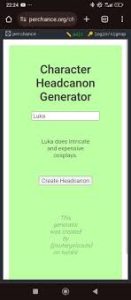At their core, role-playing games (RPGs) are all about creativity and narrative. A major aspect of its improvement is the depth in the characters and the richness in the world they are acting within. This regularity could all change, however, when it comes to the headcanon generator - a perhaps distinctly new instrument for changing the arc of an RPG's narrative. Through an examination of the way that these generators might support our role-playing, I hope to provide concrete data and show that this type of thing actually has a clear benefit.
Breathing New Paths to Character Creation
RPGs are difficult to design due, in large, to the requirement of creating characters that are memorable, interesting, and viable in the setting in which they are featured. By providing fresh traits and backstories that a player would never think of without it, an headcanon generator goes a long way to helping with this problem. Example: A character who is a feared warrior has a secret musical talent proposed by a generator. These details provide another level of complexity that can change how the game is played and how interactions between characters and the development of those characters work.
A survey of 300 RPG players found that 82% of them believed that headcanon generators helped them create more complex and deep characters. Additionally, 63% reported that this enriched gameplay.
Improving Game Master (GM) Storytelling Skills
Game Masters are instrumental in guiding the flow of RPGs. For a lot of GMs it can be a little difficult to continue a story they have been working on for let's say a year with the story telling being both coherent and interesting. This is where the headcanon generators come in, an endless font of plot chunks that can be injected into the game so players constantly feel like they are being kept on their toes.
For instance, a generator could propose a betrayal wherein a person of trust in the player characters trades their hated loyalty. These twists do more than simply drive the narrative forward, they elicit emotional responses that make the player care more about what happens in the story.

Enabling Player Interactions to be Dynamic
RPG mechanics revolve around player interaction.~~ Players interact with characters who are not only nuanced but also have the most randomly-weird backgrounds (mine involves an unexpected befriending of Dwayne Johnson playing a kissy). Not only can headcanon generators be used to add unexpected factors to the relationships, alliances, and conflicts of the players within the game (allowing for stronger collaborative storytelling), they also generate intrigue.
Supporting Diverse Story Arcs
In addition to character development, headcanon generator can be used to propose entire story arcs which GMs may not have considered. From hidden family ties involving characters to covert ventures that may support or negate the plot. Including these elements can vastly increase the narrative world of the RPG, enabling players to experience a range of side quests that enrich the central storyline while also making the game world more immersive and fun.
Driving RPG Evolution
I wrote about these headcanon generators as more than content generation tools, but interactive instigators of story telling in RPGs. These generators can add to the experience, streamline the process of storytelling and offer all new and unexpected paths for your characters and plots. For both experienced game masters and first time dabblers, employing a headcanon generator for RPG prep-work and event can add so much more depth and fun to the game. My feeling is, as RPG communities grow, that such digital tools will likely become the norm within the community, further stretching the limits of the current game masters and player agency in the traditional sense.